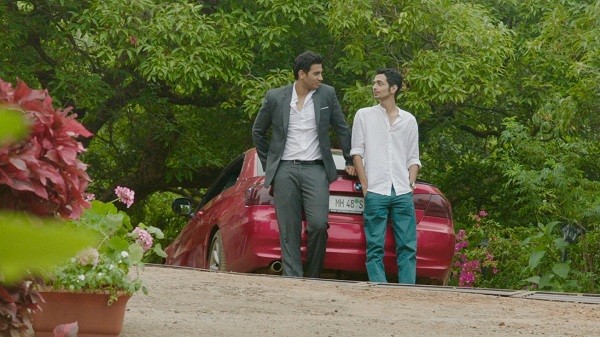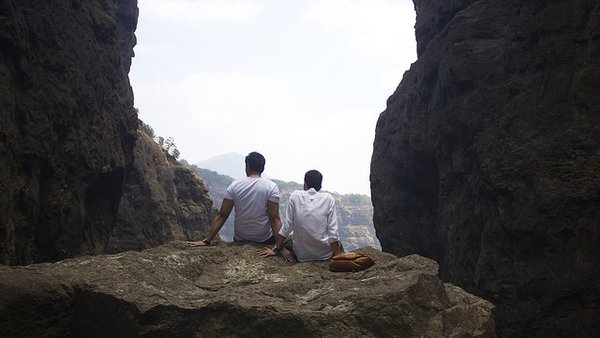By David Pountain
Directed by Sudhanshu Saria
The opening minutes of Loev, the promising debut feature from India’s Sudhanshu Saria, establishes the film’s world and the audience’s positioning within it like a jigsaw puzzle being systematically assembled from its central piece outwards. Beginning in silence and darkness, a lone match soon dimly illuminates the frame, offering just enough light to reveal the face of our protagonist, the young, currently shirtless Sahil, while vague background noises drift in from some unseen place. Moments later, a lit candle allows us to see the cramped state of Sahil’s apartment, shortly before a second character, Alex, enters the frame. Even when a dialogue begins and the two young men (lovers as it eventually becomes clear) venture out fully clothed into the city of Mumbai, Loev is still in the process of economically building Sahil’s reality, staying resolutely restricted to the seat of their car, permitting us to see little more than our lead is capable of seeing.
But while these introductory scenes see the audience remain faithfully within the periphery of Sahil’s perceived environment, the inner workings of his mind remain at a distance. By placing emphasis on our lead’s environmental conditions rather than his direct psychological state, Loev keeps the viewer as a sympathetic but removed observer, laying the foundations for the intriguing game of subjectivity and objectivity that distinguishes the film from most relationship dramas. Saria dares not get too close to his subjects because, as it soon turns out, Sahil and the old friend he picks up at the airport, Jai, remain hesitant themselves in physically following through on their passions for each other, allowing subjects and audience to share in a state of regretful inactivity and suppression .

The relatively smooth-talking, serious-minded Jai is officially in Mumbai on business but the trip to his meeting is used as an excuse to catch up with Sahil. When Saria’s camera is finally granted a leash long enough to take in Mumbai’s mesmeric beauty at large (the first but not last of the film’s stunning landscape shots), it is a moment of liberation for these two leads as they drive to the first of a series of secluded locations. Yet it is in their private moments that the bond between Sahil and Jai feels at its most inhibited, strained by such external factors as Sahil’s relationship status and Jai’s stressful job. The narrative perspective regularly shifts between the two characters to thoughtfully illustrate how mood and context can affect someone’s patience and tolerance for other people, revealing the duality between fun-loving and annoying; single-minded and irritable; and solemn and antisocial. It is often only in public places where something of a fragile equilibrium can be formed between the two perspectives, if only when their relationship forms a united front against curious or judgemental outsiders (it’s certainly worth noting that homosexuality is still criminalised in India).
Stylistically, Loev loses its cool in the final third. After almost an hour of intense emotions bubbling beneath the social surface, the film delves somewhat jarringly into the territory of more overt drama with direction that’s less formally compelling than that which preceded it and dialogue that doesn’t always mesh with the more realist manner found elsewhere in the script. Luckily, this new, more direct mode for the picture comes with its own anxious and melancholic if lesser pleasures, introducing an intriguing layer of moral ambiguity that mostly prevents the quiet conclusion from getting too sentimental.
This darker, more open-ended element to the climax acts as partial compensation for the suddenly reduced psychological distance between the audience and the characters, in that it allows the viewer to maintain some wiggle room in their opinions of Sahil, Jai and their respective situations. The drama of Loev resonates most poignantly when the film doesn’t tell its viewers exactly what to think but rather offers us a range of interpretations based on different personal circumstances, each informed by a different part of the same complex reality. It amounts to a uniquely compelling feature of appropriately ambiguous conclusions but undeniable feeling.
Discuss Loev on FilmDoo.com









